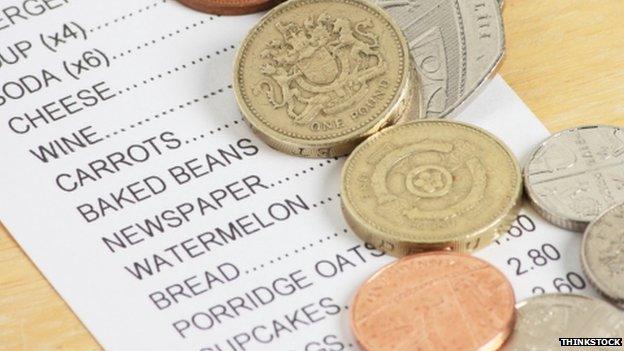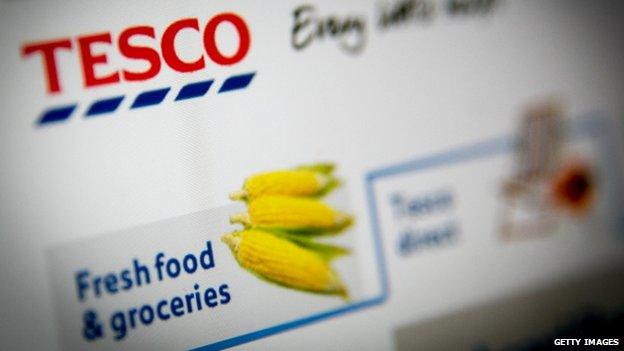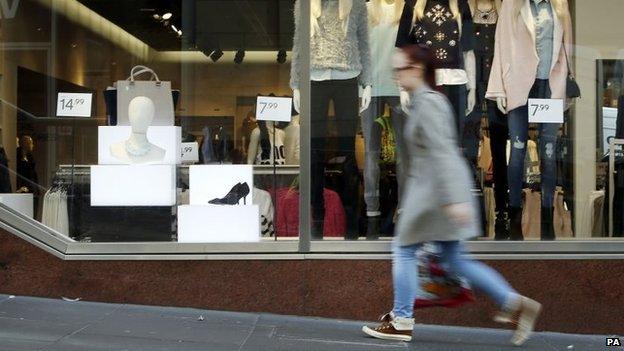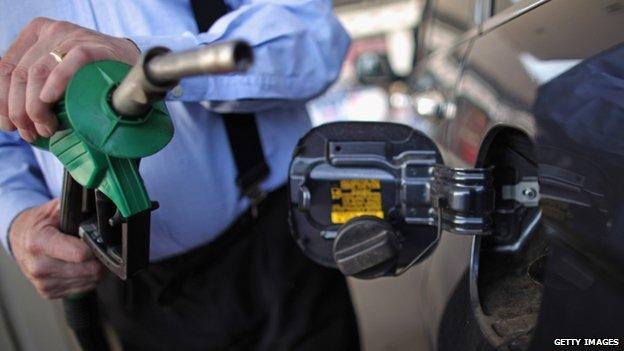Daily question: Would the price of food go up in an independent Scotland?
- Published
As the people of Scotland weigh up how to vote in the independence referendum, they are asking questions on a range of topics.
In this series, we are looking at those major questions and by using statistics, analysis and expert views shining a light on some of the possible answers.
Here, we focus on what you pay for food and petrol, and whether that would increase or not in an independent Scotland.
Do you have a referendum question? Let us know by....
Emailing newsonlinescotland@bbc.co.uk.
We can also be found on Twitter @bbcscotlandnews, external
And on Facebook, external.
BBC news website users have been posing questions about supermarket prices. David Roland asks: "How much would supermarket prices increase? At present UK prices are standard. but Scottish costs must be higher due to the lower population density and longer transport distances."

How do supermarkets set prices in Scotland?
.jpg)
Supermarkets set their own prices - with plenty of science behind the whole process such as tracking wholesale costs, competitor's pricing and lots of other variables.
Currently, many major supermarket prices are no different in Scotland than they are in shops in England, Wales or Northern Ireland.
This is despite the fact that they face higher distribution costs in Scotland, as well as a public health levy on selling alcohol and tobacco (which is due to end in 2015).

Why might food prices change?

Those higher distribution costs in Scotland are currently absorbed into the supermarket's UK margins.
But if they decided to treat Scotland as an international market they could then forego the "national pricing" policy (there are minor differences in certain areas) they currently have.
On the other hand, Tesco say they source a lot of local Scottish ingredients. For example, they promised all fresh beef, external in its Scottish shops will be Scotch beef. So it is also likely that fresh products might get cheaper - as is the case in Ireland.
Another potential reason for increasing prices would be if the regulatory and tax burdens increased.
The chief executive of supermarket chain Morrisons, Dalton Philips, told the Financial Times, external: "If the regulatory environment was to increase the burden of the cost structure on business, that would potentially have to be passed through to consumer pricing, because why should the English and Welsh consumer subsidise this increased cost of doing business in Scotland?"
It's not that Scottish regulations would be more burdensome, it's more the fact that having two different lots of regulations makes it more expensive for companies to comply.
Although the Scottish government suggests their plan to reduce corporation tax would balance out any increased cost for supermarkets doing business in Scotland.
Supermarkets are often involved in price wars, where they cut prices to remain competitive with rivals. If one supermarket group was to increase prices in Scotland, another would most likely capitalise on that by announcing a price freeze in Scotland.
However, it could happen gradually over time as people got used to the fact that Scotland was an independent country.
But Nicola Sturgeon said this was a "scare story" and it was "insulting people's intelligence".

What else have supermarkets been saying about this?

The first time this issue really cropped up in the referendum debate was back in December 2013.
At the time, Asda's chief executive Andy Clarke said, external: "At Asda, we believe in fairness so the price customers pay for a pint of milk or loaf of bread is the same regardless of where they live in the UK."
Although he also said that a "Yes" vote in 2014 could result in Scotland being a less attractive investment proposition for business and put further pressure on our costs".
Despite that, neither Asda nor Morrisons said they had any plans to raise prices in an independent Scotland.
However, Mr Clarke has made another statement this week, external in which he said: "If we were no longer to operate in one state with one market and - broadly - one set of rules, our business model would inevitably become more complex. We would have to reflect our cost to operate here.
"This is not an argument for or against independence, it is simply an honest recognition of the costs that change could bring. For us the customer is always right and this important decision is in their hands."
A spokesman for Morrisons, meanwhile, suggested in January that food prices could actually fall, external in an independent Scotland, saying: "If an independent Scotland increased or decreased regulation or taxes we'd have to take a second look at our pricing. Clearly that could work for or against Scottish customers depending on the direction of travel."
Recently, a spokesman for Tesco - which is neutral on the referendum - had to make a statement after the pro-union Better Together campaign used their prices in Ireland to suggest that shopping in Scotland could cost 16% more after a "Yes" vote.
They said this suggestion was "entirely speculative" and wrote to a querying customer: "I can confirm that this is not true", adding that it had "a great business in Scotland" and would "continue to offer the best prices whatever the outcome of the referendum".

What about other retailers?

This week, Sir Charlie Mayfield, chairman of the John Lewis Partnership (which also owns Waitrose), told the BBC: "When we are talking about two separate countries it is most probable that retailers will start pricing differently."
He called this an "economic consequence to a Yes vote".
Similarly the boss of B&Q, Sir Ian Cheshire, has repeated comments, external he made back in May about a potential price increase for Scottish shoppers.
He said: "We think there is a real risk in terms of higher costs, the uncertainty about a currency union and the difficulty of making investment decisions.
"Smaller, more complex markets often mean passing higher costs on to consumers."
However, the chief executive of the pro-independence campaign group Business for Scotland, Gordon MacIntyre-Kemp - who has expertise in the retail sector - has suggested prices are more likely to fall, external in an independent Scotland in the long run.

Does the price of petrol work in the same way?

Again, supermarkets do set their own prices at their petrol stations and could have different prices at different stations across the country.
Currently, the UK average petrol price stands at 129.18p a litre, while the average diesel price is 133.55p a litre.
There are a number of costs, external involved which make up the final price of a litre of fuel. First, there's Fuel Duty, which is essentially an added tax before the petrol is sold. There's then a cost for the petrol itself that goes to the company supplying the crude oil and those who refine it into petrol or diesel. VAT is then added, before the retailers add their charge on top.
In a post-independent Scotland, the Scottish government has suggested in its White Paper, external that petrol prices could become cheaper in Scotland than England.
It says: "With independence, this Scottish government will examine the benefits of a introducing a Fuel Duty Regulator mechanism to stabilise prices for business and consumers and how this could be made to work alongside our Scottish Energy Fund."